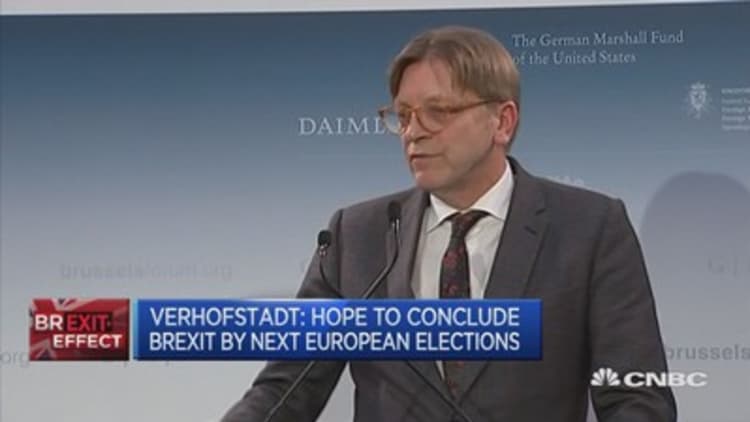European leaders are gathering in Rome on Saturday to celebrate the 60th anniversary of the European Union but one of its members is missing the party.
U.K. Prime Minister Theresa May is not attending the celebrations in Italy, where the other 27 heads of state will be discussing how to take the EU further.
"It will be a celebration with a bittersweet taste as the future path for Europe has probably never been more unclear than today," ING said in a note on Friday.
Looking at the current state of the EU, not only is the U.K. about to set a precedent by leaving the union but there are other issues to resolve. The refugee crisis, the moribund economic recovery, the rise of populism and anti-EU sentiment are only a few examples of that.
Frans Timmermans, the first vice-president of the European Commission, told CNBC on Thursday that Europe will have to come up with better proposals to stop people from turning to nationalistic parties.
"The European Commission has officially restarted the discussion on the future of Europe. A discussion deemed necessary after the Brexit vote," ING added.
The executive arm of the EU has proposed five options as to how the 27 countries should evolve in an attempt to stop the anti-EU rhetoric across the bloc and prevent other countries from following the U.K.'s example.
The option that seems to be gathering the most support would allow countries to integrate at different speeds – the idea of a two-speed Europe. However, analysts have their doubts as to whether it would improve the Union.
"(The EU) will seriously consider the strategy of moving forward at multiple speeds, which enjoys solid political backing in many of the 'older' EU states – although the EU would have to apply this strategy with care, to address the concern that multiple speeds could lead to new divisions in the EU," Reinhard Cluse, economist at UBS, said in a note on Friday.
Indeed some countries see this option as a threat that would marginalize them from the core European countries.
Poland's influential politician and chair of the ruling Law and Justice party said earlier this week: "We cannot accept any announcements of a two-speed Europe." Jarosław Kaczyński added that "this would mean either pushing us out of the European Union or downgrading us to an inferior category of members."
The controversial Hungarian leader Viktor Orban has voiced similar concerns. He said that Poland, the Czech Republic, Slovakia and his own country – the so-called Visegrad group – did not join the EU to be its periphery.
However, the powerful German finance minister dismissed the idea of a two-speed Europe was to exclude some countries.
It is "not directed against others. We don't want to aspire to exclusivity. But those who want to and can move forward with closer co-operation should be able to do that, and others will follow them," Wolfgang Schaeuble told the Financial Times.
He added that "the federal idea has not gone away but at the moment it has no chance of being realized…In all or in most European states there are no broad majorities to give additional shares of national sovereignty to Brussels."
Ultimately, getting 27 nations to agree on policy is a difficult task to achieve.
"In reality, of course, the EU is a supertanker that cannot be turned around overnight. We therefore believe that most things will stay as they are – but the EU is unlikely to admit that," Cluse from UBS added.
Sandro Gozi, the Italian minister for EU affairs, said "even if we just get the member states to reaffirm their faith in Europe, it will be an accomplishment," the Financial Times reported.



